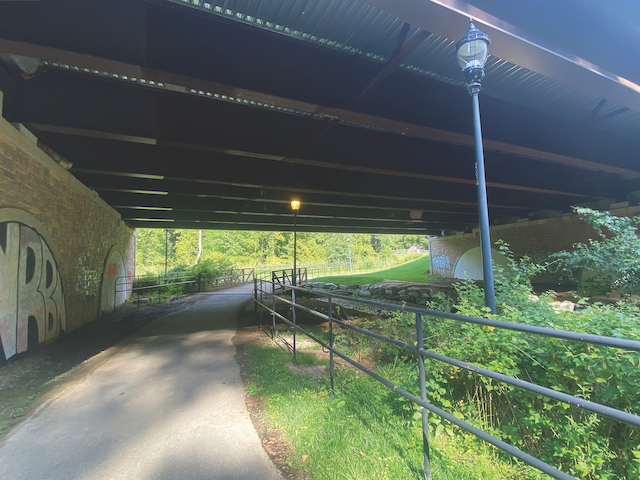The world has seen a significant increase in antisemitic incidents since the Oct. 7 attacks in Israel. Despite its large Jewish population, many Jewish residents in the greater Washington, D.C. area have dealt first hand with these antisemitic acts.
The Anti-Defamation League (ADL) has reported several antisemitic incidents in Montgomery County over the past few weeks. In November alone, swastika graffiti was found at both Thomas S. Wootton High School in Rockville and a Jewish state delegate’s house in Gaithersburg, not to mention the countless additional incidents reported statewide.
Lyndee Sklute, a senior at Winston Churchill High School in Potomac, says antisemitism has significantly impacted her experience attending a Montgomery County Public School. According to Sklute, she became more cognizant of what she does in all aspects of everyday life since Oct. 7.
“I have felt silenced and unable to [do] simple things like talk about Shabbat or talk about anything that I normally would talk about,” Sklute said.
In Sklute’s case, she has felt “not comfortable” at her school because of Judaism’s “obvious connections” to Israel, which puts her, as a Jewish student, in a more dangerous position because of many of her peers’ dislike of Israel and its government.
Ella Elimelech (‘23) is a freshman at the University of Maryland (UMD), a school that has seen many acts of antisemitism recently despite Jews making up 19.1% of its student body. According to the Diamondback, UMD’s student run publication, the university has had 37 hate bias reports in October and 46 in November. Jewish students at UMD have been targets of antisemitic harassment, causing Elimelech to feel unsafe on campus. This fear only intensified after a particular protest organized by Students for Justice in Palestine (SJP) on Nov. 9.
“They [chalked] ‘Holocaust 2.0,’ and they also chanted ‘Intifada now’, which is calling for violence against students here on campus…” Elimelech said. “During our protests [in support of Israel], someone held up the Taliban flag.”
Because these sentiments encourage violence against Jews, the local police department has been involved and Elimelech expressed her gratitude for the police’s presence on campus. However, Elimelech has also felt frustrated by the response from administrators when she and other students have gone to them for support.
“We kept asking them to call [SJP’s] chalking antisemitic and violent, and they were just like, ‘freedom of speech exists, and this is hate speech, but there’s not much we can do,’” Elimelech said.
Guila Franklin Siegel, parent to junior Rafi Siegel and Associate Director of the Jewish Community Relations Council Greater Washington (JCRC), responds directly to these local antisemitic incidents. Since Oct. 7, she and her colleagues have had to work 12 to 15-hour work days because of the uptick in antisemitism.
“We have seen an explosion of antisemitic incidents, particularly [at] Montgomery County public schools,” Siegel said. “[There have been] pro-Palestinian walk-outs … What we were seeing was walkouts that were incredibly aggressive … There were Jewish students feeling very fearful. And there were also a lot of incidents of Jewish kids being personally harassed.”
But the JCRC has not only been responding to antisemitic incidents at these public schools. According to Siegel, the JCRC has also received an influx of reports of hateful behaviors in various workplaces, graduate programs and even elementary schools, with young children being told by their peers, “We hate Jews.”
Siegel, in part, attributes this rise in antisemitism to the general culture surrounding the Israel-Palestine conflict, as many people “don’t apply the same standards to Israel that they do to other … countries that have to engage in military action to defend their borders.” She also notes how Israeli conflicts with Hamas lead to “explosions” in antisemitism, yet sees this as a much more “protracted conflict” than ever before.
Elimelech, Siegel and Sklute all shared how emotionally trying the last several weeks have been. Because of this, they emphasize the importance of finding different ways to cope with the emotional effect that this conflict has had and will continue to have on Jews in the U.S. and abroad.
“The most important thing in terms of combating antisemitism is for us to continue to live proudly as Jews,” Siegel said.
This story was originally published on The Lion’s Tale on January 4, 2024.




































